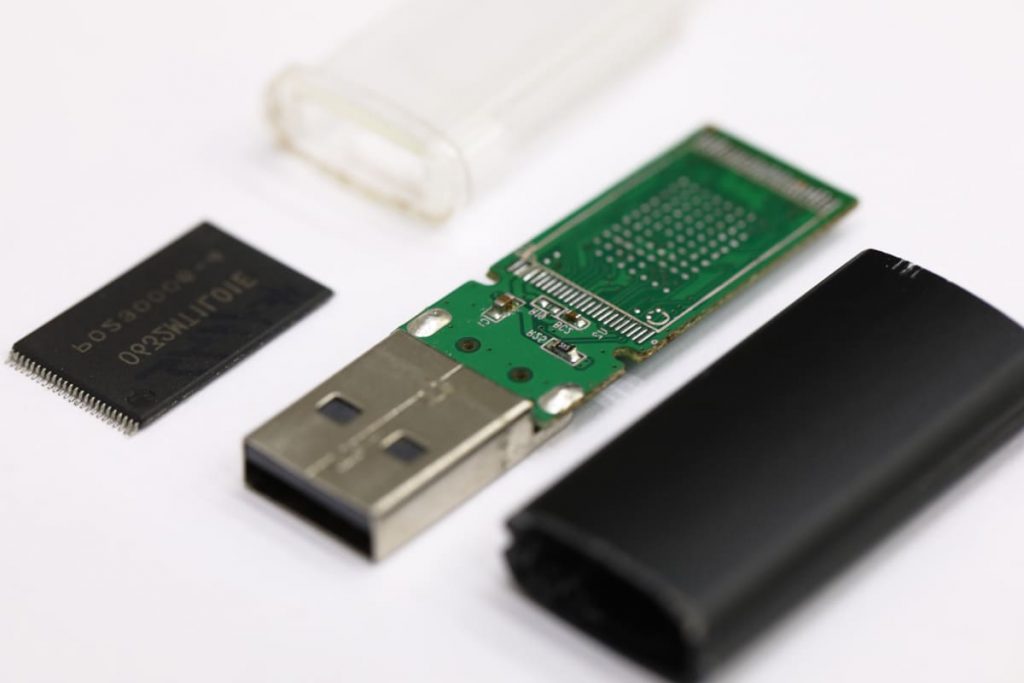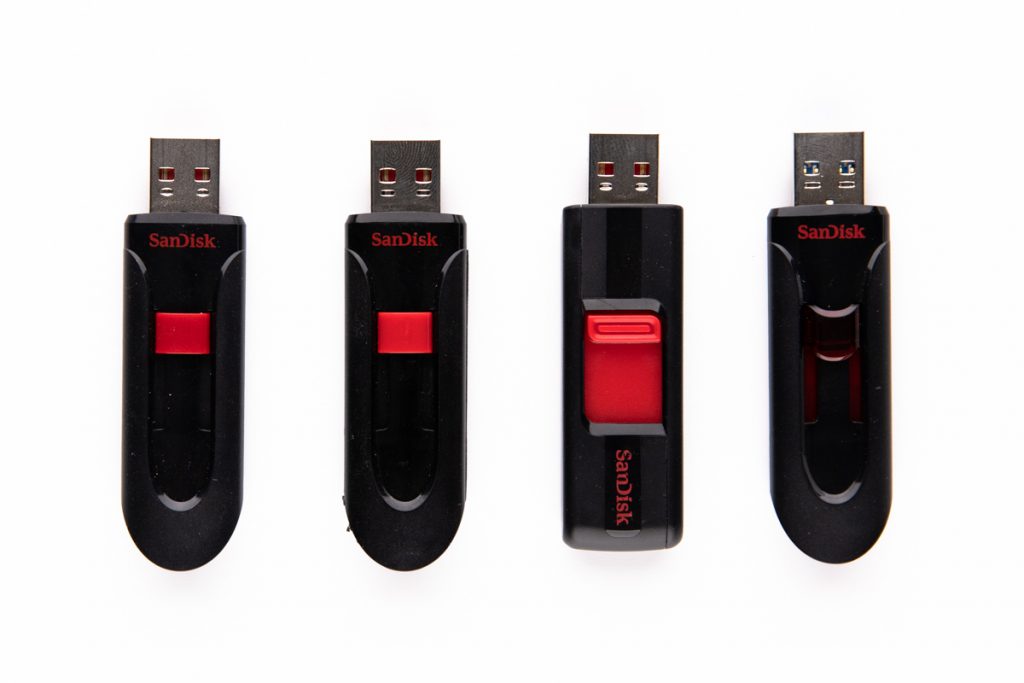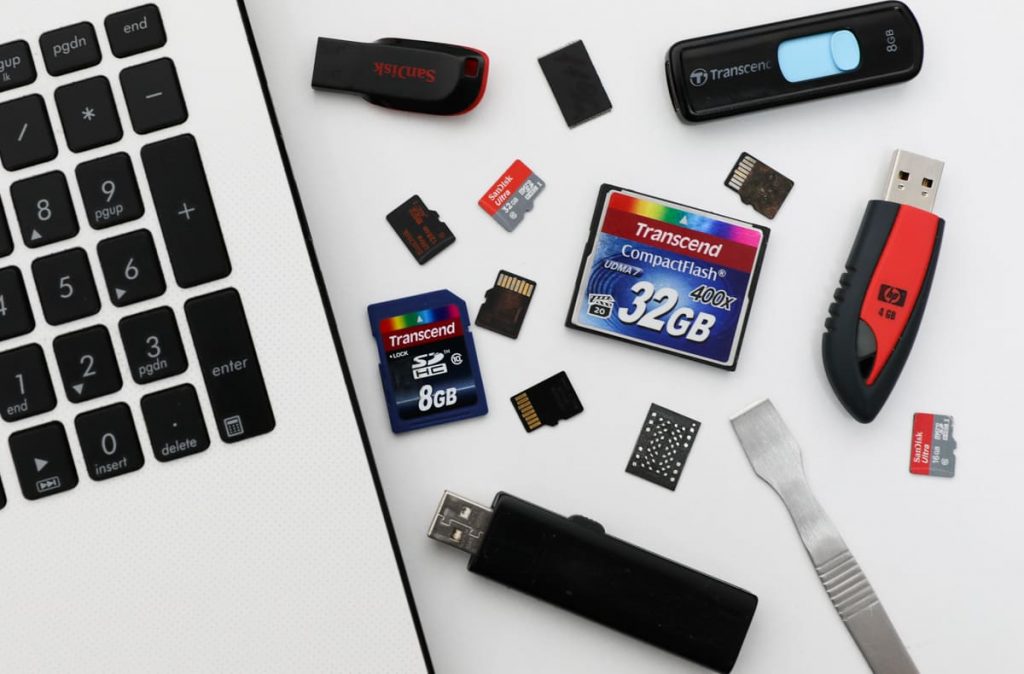Flash drives are widespread data storage devices that store essential information of computer users all over the world. People use these drives to carry valuable data with them and, even more, often employ them as backups.
The importance of flash drives is very high, so it is vital to check the devices’ condition regularly. However, failure can occur unexpectedly and cause a lot of trouble for the user.
Flash Drive Failure Signs
A flash drive failure can not stay unnoticed. Collapse can happen unexpectedly but will definitely show its symptoms as soon as you try to connect the drive to your desktop or laptop computer.
There are several states of a flash drive that can indicate collapse.
- The drive is recognized but shows 0 Mb.
- The device is defined by the OS but shows less capacity.
- The drive is recognized, but access to the data is lost.
- The computer does not identify the flash media.
- Hardware-level data encryption.
If you are connecting the drive to your computer and notice the symptoms mentioned above, it means that you are facing a flash drive failure.

When a malfunction occurs, it leads to severe consequences, including complete data loss. There are various reasons why access to your files can be lost, so it is essential to understand the causes and how you can avoid them.
Why Does Data Loss on Flash Drives Occur?
Mechanical Damages
It is essential to treat flash drives carefully. These devices have delicate USB connectors and can snap from a relatively small amount of pressure. Dropping the USB flash drive will not result in such damage as forcing a thumb drive into your computer. So, it is better not to apply excess pressure when inserting or unplugging your thumb drive. This way, you can prevent data loss on your device.
Viruses and Malware
The portability of flash drives is both advantage and disadvantage. Due to their mobility and compatibility, these drives can be connected to any computer. The number of malware programs attacking computers is increasing daily. These viruses will damage not only your operating system but also cause complete data loss on the connected flash drive.
Overheating
While modern USB sticks can handle a variety of temperatures, old models of memory chips are often much more susceptible to heat damage. An overheating will melt away solder, destroying crucial elements and causing permanent damage to USB connectors. Memory cards are also vulnerable to extreme heat in extreme circumstances. Usually, flash devices will function well at room temperature. But if your flash media feels excessively hot, unplug it immediately to prevent damage and save important files from a USB drive.
Accidental File Deletion
Human errors have often become the reason for losing essential data. Every computer user has faced this problem at least once. This mistake can occur in various scenarios - not saving the file and closing the application by mistake, editing a document but bypassing to save the changes, or simply deleting the file without realizing that it can be used later or paying attention to what is deleted. While it may seem negligible loss of data now, it may perhaps become a harmful loss of data in time of need. Performing regular backups can save you from this kind of situation.
How To Avoid Flash Drive Data Loss
As with all data storage devices, the best possible way to avoid disaster is to back up all critical data frequently. Without a secure backup, a single issue of failure can lead to complete data loss. But to prevent data loss, you should treat your drive appropriately.
Storing flash media in proper conditions and not exposing your flash drive to extreme temperatures, humidity or pressure will keep your drive functioning longer. Incorrectly removing your flash drive can corrupt the files and file system. Also, you should extract the flash drive safely and never unplug the device while it is reading or writing.
"*" indicates required fields
What to Do if Failure Occurred?

However, if the failure still occurs, there are several essential steps you should go through. When the collapse happens, almost every computer users try to deal with this problem without professionals’ assistance.
There are many repair tutorials on the Internet, but you should understand that flash memory devices have very small and complicated systems. Damaging the minor component of your media even a bit will lead to irreversible consequences.
USB C Flash Drive
USB-C flash drives are a popular way to store and transfer data, thanks to their speed and versatility. However, there are several common reasons why data loss can occur on USB-C flash drives. Here are a few of the most common causes:
Physical Damage
USB-C flash drives are small and portable, which makes them vulnerable to physical damage. Dropping, crushing, or exposing the drive to extreme temperatures or moisture can cause data loss or even render the drive unusable.
Power Surges
Power surges or voltage fluctuations can damage USB-C flash drives and cause data loss. This can happen when the drive is connected to a computer or other device that experiences a power surge.
File System Corruption
The file system on a USB-C flash drive can become corrupted, making it impossible to access the data stored on the drive. This can happen when the drive is disconnected improperly, when the computer is shut down unexpectedly, or when the drive is infected with malware.
File System Corruption
The file system on a USB-C flash drive can become corrupted, making it impossible to access the data stored on the drive. This can happen when the drive is disconnected improperly, when the computer is shut down unexpectedly, or when the drive is infected with malware.
If you still have access to your data, but notice that some are missing, do not use the data recovery software. There is a slight possibility that an unverified restoration tool will help you save the data, and if your flash drive has essential files on it, do not take the chance.
Instead, entrust your device to a reputable data recovery company with years of experience. PITS Global Data Recovery Services has thousands of successful cases on its account and has all the equipment to work with such memory devices as USB flash drives, memory chips, memory cards, etc.
Our engineers regularly attend qualification courses and maintain certificates. Thus, we can guarantee that recovering lost files from any type of flash drive is possible with our services. Contact us to get more information about our flash drive recovery services.
Frequently Asked Questions
What is a flash drive?
A flash drive, also known as a USB drive, thumb drive, or pen drive, is a portable storage device that uses flash memory to store and transfer data. It connects to a computer or other devices via a USB port.
What is flash drive data loss?
Flash drive data loss refers to the situation where data stored on a flash drive becomes inaccessible, corrupted, or accidentally deleted. It can occur due to various reasons, including hardware or software failures, human errors, malware infections, or physical damage to the flash drive.
What are common reasons for flash drive data loss?
Several common reasons for flash drive data loss include accidental deletion of files, formatting the drive by mistake, virus or malware infections, file system errors, sudden power surges or outages, physical damage to the flash drive (e.g., bending, water damage), and disconnecting the drive improperly without safely ejecting it.
How can accidental file deletion occur on a flash drive?
Accidental file deletion on a flash drive can happen when users mistakenly select and delete files or folders. It can occur due to human error, such as selecting the wrong file or unintentionally emptying the Recycle Bin or Trash on the computer.
Can data be recovered from a formatted flash drive?
In some cases, data can be recovered from a formatted flash drive. Formatting erases the file system on the drive, but the actual data may still be present until overwritten by new data. Using data recovery software or seeking professional help from a data recovery service increases the chances of recovering formatted data.
Do flash drives go bad?
Yes, flash drives can go bad over time. Flash drives have a restricted lifespan since their memory cells can only endure a finite number of write and erase cycles. Various factors, such as usage frequency, flash drive quality, and environmental conditions, can affect their durability. As they deteriorate, data may become corrupted or unreachable.
